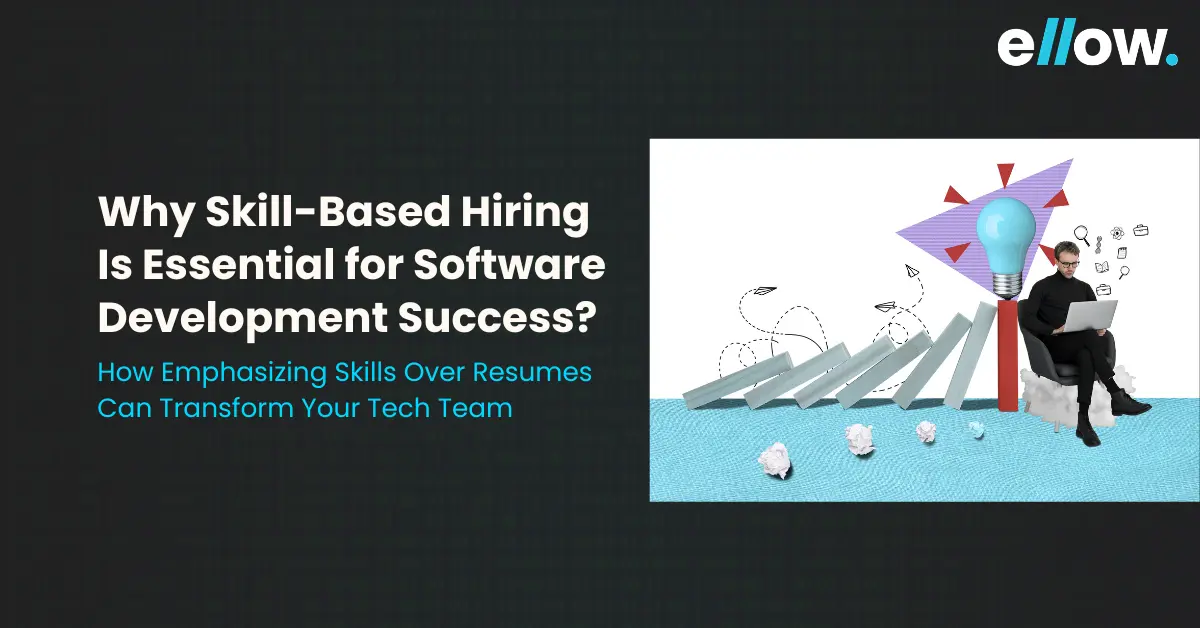Let’s build the future together.
Great ideas need great people. Partner with us to bring your vision to life, or take the first step in your career by joining our team of innovators.

The war for talent is fiercer than ever, and companies realize a college degree isn’t the only weapon in the arsenal. Enter the skill-based hiring revolution a game-changer that throws out the old resume rulebook and focuses on what truly matters: can you do the job?
Imagine a world where your coding skills land you your dream tech job, not that dusty old philosophy degree. LinkedIn reports that 60% of companies are ditching the traditional qualifications game and focusing on real-world abilities. Harvard Business Review echoes this, with a rising chorus of industries of skill-based hiring.
Why the sudden shift?
Simple. Companies need superstars who can hit the ground running, not spend months deciphering codes. Tech giants like Google and Apple are leading the charge, valuing a candidate’s ability to deliver over a fancy piece of paper.
This isn’t just good news for businesses it is a game-changer for everyone! Finally, your hard-earned skills and experience get the recognition they deserve.
Ready to move past old-school resumes and find top talent to boost your business? Join us as we explore skill-based hiring. We’ll show you its benefits, how to start using it, and how it can change recruitment to focus on skills first!
Skills-based hiring is a recruitment approach that focuses primarily on the specific abilities and competencies of candidates rather than traditional benchmarks like educational background or years of professional experience.
In this strategy, employers pinpoint the exact skills necessary for a particular role and evaluate candidates on their proven ability to perform these skills effectively
This approach allows employers to consider a broader and more diverse pool of applicants, including those who have gained expertise through non-traditional paths such as online courses, vocational training, or practical experience.
Skills-based hiring can uncover talent that might be overlooked in conventional hiring processes by focusing on what candidates can do rather than where they have been.
The growing popularity of skills-based hiring is partly due to its effectiveness in addressing the skills gap. Many industries need more workers with the precise skills needed for modern jobs.
Traditional hiring practices often miss capable candidates who need more formal qualifications but possess the necessary skills. By shifting the focus to competencies, employers can more accurately match job requirements with candidates’ abilities, leading to better job performance and employee satisfaction.
Furthermore, skills-based hiring promotes a more inclusive workforce by valuing diverse experiences and backgrounds, ultimately contributing to a more innovative and adaptable organization.
Companies often focus on practical skills like coding, knowledge of specific programming languages (e.g., Python, Java, JavaScript), and experience with development tools.
For instance, a tech company might choose a candidate who has created impressive coding projects and actively contributed to open-source communities instead of one who only holds a computer science degree.
In digital marketing, businesses prioritize abilities in content creation, social media management, SEO, and data analysis. A candidate with successful marketing campaigns and a strong online portfolio might be preferred over someone with just a marketing degree and little hands-on experience.
Skills-based hiring is gaining popularity because it focuses on what candidates can do, rather than just their educational background. This method values practical abilities, ensuring employees have the necessary skills for the job.
Many companies are finding that job performance is better predicted by specific skills rather than traditional qualifications. This approach helps create a diverse workforce by recognizing talents developed through various experiences, not just formal education.
Organizations are increasingly adopting skills-based hiring to better match the right people with the right jobs. This trend highlights the importance of real-world expertise over academic credentials, making it a preferred hiring strategy for many businesses.
Skills-based hiring is becoming more popular for several key reasons:
Overall, skills-based hiring aligns with the current and future demands of the job market, providing a more flexible, inclusive, and capable workforce.
Finding and evaluating qualified software developers is challenging. Technical skills are difficult to assess accurately from resumes and assessments alone. Many candidates may look good on paper but lack practical expertise.
Determining if a candidate will fit well with the existing team and company culture is another significant challenge. Cultural fit is crucial for team cohesion and productivity, but it’s hard to gauge during the hiring process.
The sheer volume of applicants adds to the difficulty, making it overwhelming to sift through resumes to find the right candidates. This can lead to potentially overlooking suitable candidates or taking too long to fill positions. To overcome these challenges, it is essential to conduct careful interviews that assess both technical and soft skills.
Thorough reference and background checks can also help ensure that only the most suitable candidates are selected. With diligence, companies can build strong, effective software development teams.
Skill-based hiring enhances talent acquisition by focusing on specific abilities rather than conventional qualifications like degrees. This approach allows HR professionals to identify the best candidates more accurately, ensuring a higher caliber of hires.
By evaluating demonstrated skills through practical assessments, work samples, or relevant experiences, companies can better gauge a candidate’s true potential and readiness for the role. This method broadens the talent pool, including individuals who may not have traditional credentials but possess the necessary skills and expertise.
By doing so, organizations can tap into a more diverse range of candidates, increasing the likelihood of finding highly capable employees who can contribute effectively from day one.
Emphasizing skills over formal education or years of experience aligns recruitment with the actual demands of the job, leading to more efficient hiring processes and a stronger, more competent workforce. This strategy ultimately results in better job performance and organizational success.
Skill-based hiring aligns employee roles with their actual abilities, fostering an environment where individuals can excel from the outset. When employees are placed in positions that match their strengths, they can perform tasks more effectively and efficiently, leading to immediate and substantial contributions to the company.
This method also uncovers hidden talents within the workforce, such as a team member’s proficiency with social media or data analysis, that might be overlooked in traditional hiring practices.
By recognizing and utilizing these specific skills, companies ensure that each employee is working in an area where they can deliver the highest quality output. Moreover, this approach minimizes the time and resources spent on training and development, as employees already possess the necessary competencies.
Consequently, aligning roles with skills not only enhances individual performance but also drives overall organizational productivity and success from the very beginning.
Skill-based hiring plays a crucial role in fostering diversity and inclusion within organizations. Traditional hiring methods often emphasize formal qualifications and specific career paths, which can inadvertently exclude talented individuals from underrepresented communities who may not have had access to conventional educational opportunities.
By focusing on the actual skills required for a role, skill-based hiring ensures that anyone with the necessary competencies can be considered, regardless of their background or how they acquired their skills.
This approach broadens the talent pool and encourages a more diverse range of candidates to apply. As a result, organizations can build teams that reflect a wider array of experiences, perspectives, and ideas, creating a more inclusive workplace culture.
This inclusivity not only enhances the work environment but also drives innovation and problem-solving by incorporating a variety of viewpoints and approaches, ultimately benefiting the organization as a whole.
Skill-based hiring places a strong emphasis on the practical abilities and knowledge that candidates bring to the table. This focus on skills over traditional qualifications sends a clear message about the company’s values: continuous learning and adaptability are crucial. By prioritizing demonstrated competencies, companies encourage both current employees and job applicants to engage in lifelong learning.
This creates an environment where individuals are motivated to keep up-to-date with industry trends, learn new techniques, and improve their skills continuously.
Additionally, this approach fosters a culture of flexibility, as employees are more likely to embrace change and adapt to new challenges. This commitment to ongoing education not only helps employees grow personally and professionally but also equips the organization to stay competitive in a rapidly evolving market.
Ultimately, a workforce that is dedicated to learning and growth is better prepared to meet emerging demands and drive the company forward.
When employees’ skills are effectively matched with their job roles, they feel more competent and satisfied in their positions, leading to a healthier work environment. This sense of confidence and fulfillment reduces stress and enhances work-life balance, resulting in higher job satisfaction and commitment.
Employees who feel valued and appreciated for their skills are less likely to seek opportunities elsewhere. Consequently, teams experience improved morale and productivity. Skill-based hiring promotes a mutual benefit for both the organization and its employees, fostering a positive cycle of retention. By aligning individuals’ abilities with their roles, companies create a workplace where employees thrive, leading to reduced turnover rates and a more stable workforce.
By embracing skill-based hiring, organizations unlock a wealth of creativity and innovation. This approach brings together individuals with diverse educational and career backgrounds, fostering a workplace rich in skills and perspectives. By considering qualifications beyond traditional markers, such as degrees, companies tap into a broader pool of talent and experiences.
This diverse workforce is primed to generate innovative solutions, drawing on a variety of problem-solving approaches. A culture that values and appreciates diverse talents cultivates a reputation for inclusivity and equity, both internally and externally. This reputation not only attracts top talent
| Aspect | Skill-based Hiring | Degree-based Hiring |
| Focus | Candidate’s abilities and skills | Education and certificates |
| Selection Process | Evaluates the candidate’s practical skills and experiences | Emphasizes academic qualifications and degrees |
| Criteria | Prioritizes relevant experience and demonstrated skills | Prioritizes educational background and formal credentials |
| Evaluation | Assessments may include coding tests, projects, or portfolios | Review of academic transcripts, GPA, and degree attainment |
| Adaptability | Flexible in considering candidates with diverse educational backgrounds | More rigid, often requiring specific degrees or majors |
| Language Proficiency | Prioritizes proficiency in relevant programming languages and tools | May overlook proficiency in specific languages if not part of the academic curriculum |
| Alignment with Market | Reflects current industry demands and trends | May lag behind industry advancements or emerging technologies |
| Outcome | This tends to result in hiring candidates with practical skills and relevant experience | May overlook skilled candidates without formal education or specific degrees |
| Risk | Lower risk of hiring candidates lacking practical skills | Higher risk of hiring candidates with theoretical knowledge but limited practical ability |
Where the demand for skilled professionals is high, a shift towards skill-based hiring is becoming more prominent. This approach ensures that companies hire candidates with the necessary skills to excel in their roles, aligning with the dynamic needs of the industry.
To implement skills-based hiring practices effectively, you’ll want to follow a few key steps:
Revising job descriptions involves shifting focus from traditional qualifications like degrees and experience to emphasizing specific skills and competencies required for the role. By using clear, understandable language that directly addresses the job’s core demands, you broaden the appeal to a wider range of applicants.
This approach encourages a more diverse pool of candidates to apply, ensuring that individuals with the necessary skills are not overlooked simply because they lack traditional credentials. Ultimately, it humanizes the hiring process and allows for a more inclusive and skill-focused environment within your organization.
Expanding recruitment criteria involves considering candidates from diverse educational backgrounds such as vocational schools, boot camps, or online courses. By broadening your talent pool beyond traditional avenues, you tap into a wealth of individuals with unique skill sets and experiences.
This approach not only fosters inclusivity but also increases the likelihood of finding candidates who possess the specific skills and competencies needed for the role. Embracing candidates from non-traditional paths enriches your team with fresh perspectives and diverse expertise, ultimately enhancing innovation and adaptability within your organization.
Integrating practical assessments, such as work samples or skill tests, into your hiring process. These assessments offer tangible insights into candidates’ abilities in real-world scenarios, going beyond resumes or interviews. By observing candidates’ skills in action, employers can make more informed hiring decisions based on demonstrated competencies rather than just qualifications on paper.
This approach ensures a more accurate assessment of candidates’ suitability for the role, ultimately leading to better hires and a stronger workforce aligned with the organization’s needs.
Fostering a growth mindset within your organization involves providing learning opportunities for employees to continuously develop new skills. By encouraging a culture of ongoing education and improvement, you empower your team to adapt to changing demands and embrace skill development as a fundamental aspect of their roles.
This not only supports your skills-based hiring approach by ensuring employees are equipped with relevant competencies but also cultivates a workplace environment where individuals are motivated to grow professionally. Embracing a growth mindset ultimately enhances organizational agility and competitiveness in today’s dynamic job market.
Utilizing technology is essential for effective skills-based hiring. Leveraging applicant tracking systems (ATS) equipped with advanced AI capabilities streamlines candidate screening, ensuring a more efficient and objective process. These systems analyze applicants based on their demonstrated skills, reducing bias and improving accuracy in candidate selection.
By automating tedious tasks and providing data-driven insights, technology enhances the effectiveness of your hiring efforts. This integration of AI not only saves time but also facilitates a more thorough evaluation of candidates, ultimately leading to better hiring decisions aligned with the skills your organization needs.
Through training, your team learns how to effectively assess candidates’ skills and conduct competency-based interviews. This ensures that the hiring process aligns with the company’s goals and values. By equipping your team with the necessary skills and knowledge, you improve the accuracy of candidate evaluation, leading to better hiring decisions.
Ultimately, an educated hiring team contributes to the success of skills-based hiring practices and helps create a more inclusive and diverse workforce.
emphasizes the importance of transparently communicating your commitment to skills-based hiring to both your team and potential candidates. By articulating how this approach aligns with your company’s values and goals, you establish trust and attract individuals who share your vision. This communication builds a strong foundation for collaboration and ensures that everyone involved understands the principles guiding your hiring process.
Ultimately, by openly sharing your dedication to skills-based hiring, you reinforce your organization’s commitment to fostering a fair and inclusive environment where talent is recognized and valued based on skills and competencies.
Integrating AI-powered tools in your skills-based hiring process enhances efficiency and accuracy. These tools utilize advanced algorithms to screen and identify candidates based on their specific skill sets, streamlining recruitment efforts. By automating tasks such as resume screening and candidate matching, AI reduces bias and ensures a more objective evaluation process.
Additionally, AI tools can analyze large volumes of data to identify trends and patterns, enabling better decision-making in talent acquisition. Overall, leveraging AI technology in hiring facilitates a smoother and more effective skills-based approach, ultimately leading to better hiring outcomes for your organization.
When implementing skill-based hiring, it’s crucial to focus on the abilities candidates bring to the role. Consider if they possess the necessary technical skills like programming and problem-solving, as well as soft skills relevant to your business. Assess if they align with your company’s culture and demonstrate the right mindset.
Prioritize skills over degrees or educational qualifications when evaluating candidates. This approach enables you to discover talent regardless of their academic background.
Implementing skill-based hiring may require conducting assessments for numerous applicants, which can be labor-intensive. At ellow.io, we streamline this process for you. Our platform enables you to hire based purely on skills, bypassing traditional barriers. Simply outline your requirements, and we’ll match you with the right developer.
Recommended Read: Case study: How ellow.io Helped a Leading Firm Recruit 20+ Full-Stack Developers in Just Three Weeks!
Skilled-based hiring is becoming increasingly crucial in today’s job market, highlighting the significance of continuous learning. Staying updated with industry trends and acquiring sought-after qualifications enhance your appeal to potential employers. This approach enables companies to identify talented individuals and fortify their teams, making it an indispensable strategy in today’s competitive employment landscape.
While technical skills remain important, adaptability, problem-solving abilities, and a proactive attitude toward learning independently are highly valued by employers.
They seek self-driven individuals who can spur innovation and help organizations navigate uncertain circumstances. Competencies showcase a candidate’s abilities and eagerness to evolve, which are invaluable traits for any enterprise preparing for an unpredictable future.
Skill-based hiring is a recruitment approach where candidates are evaluated and selected based on their specific skills, knowledge, and abilities relevant to the job role, rather than solely on their qualifications or experience.
Skill-based hiring is crucial for software development because it ensures that the individuals hired possess the necessary technical competencies and problem-solving skills required to excel in the dynamic and fast-paced environment of software development.
Skill-based hiring allows software development companies to identify and recruit candidates with the precise skills and expertise needed to contribute effectively to project success. This leads to improved team performance, faster project delivery, and enhanced innovation within the organization.
Some key skills sought in skill-based hiring for software development include proficiency in programming languages (such as Python, Java, or JavaScript), knowledge of software development methodologies (such as Agile or Scrum), problem-solving abilities, creativity, and strong communication skills.
Individuals can enhance their attractiveness to employers in skill-based hiring for software development by continually updating their technical skills, pursuing relevant certifications or training programs, actively participating in coding projects or open-source contributions, and showcasing their problem-solving abilities through portfolio projects or GitHub repositories.

GCC vs Outsourcing vs Remote Teams: What Works in 2026

Vibe Coding vs AI Assisted Coding: The Difference That Will Define the Next Generation…

From Code Generation to Bug Detection: 10 AI Tools Every Developer Should Know in…
Please feel free to share your thoughts and we can discuss it over a cup of tea.
Get a quote
GCC vs Outsourcing vs Remote Teams: What Works in 2026

Six Things to Consider When Hiring Remote Talent

ellow.io enters remote hires market with AI-based screening process